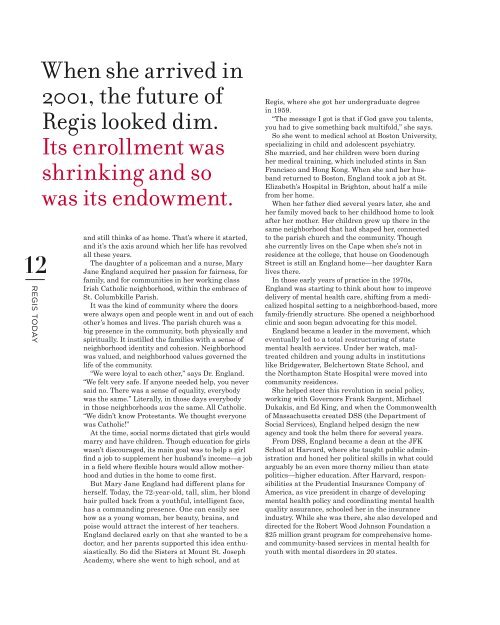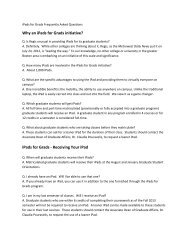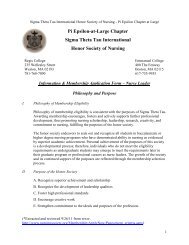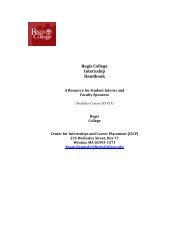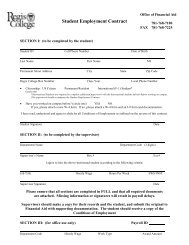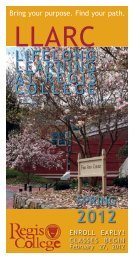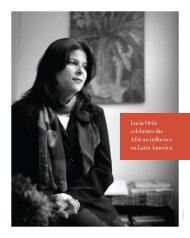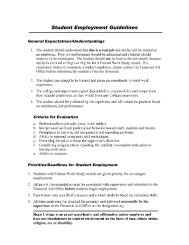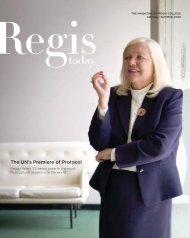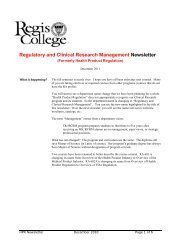Create successful ePaper yourself
Turn your PDF publications into a flip-book with our unique Google optimized e-Paper software.
12<br />
REGIS TODAY<br />
When she arrived in<br />
2001, the future of<br />
<strong>Regis</strong> looked dim.<br />
Its enrollment was<br />
shrinking and so<br />
was its endowment.<br />
and still thinks of as home. That’s where it started,<br />
and it’s the axis around which her life has revolved<br />
all these years.<br />
The daughter of a policeman and a nurse, Mary<br />
Jane England acquired her passion for fairness, for<br />
family, and for communities in her working class<br />
Irish Catholic neighborhood, within the embrace of<br />
St. Columbkille Parish.<br />
It was the kind of community where the doors<br />
were always open and people went in and out of each<br />
other’s homes and lives. The parish church was a<br />
big presence in the community, both physically and<br />
spiritually. It instilled the families with a sense of<br />
neighborhood identity and cohesion. Neighborhood<br />
was valued, and neighborhood values governed the<br />
life of the community.<br />
“We were loyal to each other,” says Dr. England.<br />
“We felt very safe. If anyone needed help, you never<br />
said no. There was a sense of equality, everybody<br />
was the same.” Literally, in those days everybody<br />
in those neighborhoods was the same. All Catholic.<br />
“We didn’t know Protestants. We thought everyone<br />
was Catholic!”<br />
At the time, social norms dictated that girls would<br />
marry and have children. Though education for girls<br />
wasn’t discouraged, its main goal was to help a girl<br />
find a job to supplement her husband’s income—a job<br />
in a field where flexible hours would allow motherhood<br />
and duties in the home to come first.<br />
But Mary Jane England had different plans for<br />
herself. Today, the 72-year-old, tall, slim, her blond<br />
hair pulled back from a youthful, intelligent face,<br />
has a commanding presence. One can easily see<br />
how as a young woman, her beauty, brains, and<br />
poise would attract the interest of her teachers.<br />
England declared early on that she wanted to be a<br />
doctor, and her parents supported this idea enthusiastically.<br />
So did the Sisters at Mount St. Joseph<br />
Academy, where she went to high school, and at<br />
<strong>Regis</strong>, where she got her undergraduate degree<br />
in 1959.<br />
“The message I got is that if God gave you talents,<br />
you had to give something back multifold,” she says.<br />
So she went to medical school at Boston University,<br />
specializing in child and adolescent psychiatry.<br />
She married, and her children were born during<br />
her medical training, which included stints in San<br />
Francisco and Hong Kong. When she and her husband<br />
returned to Boston, England took a job at St.<br />
Elizabeth’s Hospital in Brighton, about half a mile<br />
from her home.<br />
When her father died several years later, she and<br />
her family moved back to her childhood home to look<br />
after her mother. Her children grew up there in the<br />
same neighborhood that had shaped her, connected<br />
to the parish church and the community. Though<br />
she currently lives on the Cape when she’s not in<br />
residence at the college, that house on Goodenough<br />
Street is still an England home—her daughter Kara<br />
lives there.<br />
In those early years of practice in the 1970s,<br />
England was starting to think about how to improve<br />
delivery of mental health care, shifting from a medicalized<br />
hospital setting to a neighborhood-based, more<br />
family-friendly structure. She opened a neighborhood<br />
clinic and soon began advocating for this model.<br />
England became a leader in the movement, which<br />
eventually led to a total restructuring of state<br />
mental health services. Under her watch, maltreated<br />
children and young adults in institutions<br />
like Bridgewater, Belchertown State School, and<br />
the Northampton State Hospital were moved into<br />
community residences.<br />
She helped steer this revolution in social policy,<br />
working with Governors Frank Sargent, Michael<br />
Dukakis, and Ed King, and when the Commonwealth<br />
of Massachusetts created DSS (the Department of<br />
Social Services), England helped design the new<br />
agency and took the helm there for several years.<br />
From DSS, England became a dean at the JFK<br />
School at Harvard, where she taught public administration<br />
and honed her political skills in what could<br />
arguably be an even more thorny milieu than state<br />
politics—higher education. After Harvard, responsibilities<br />
at the Prudential Insurance Company of<br />
America, as vice president in charge of developing<br />
mental health policy and coordinating mental health<br />
quality assurance, schooled her in the insurance<br />
industry. While she was there, she also developed and<br />
directed for the Robert Wood Johnson Foundation a<br />
$25 million grant program for comprehensive home-<br />
and community-based services in mental health for<br />
youth with mental disorders in 20 states.


